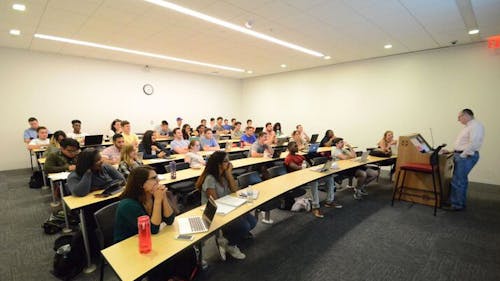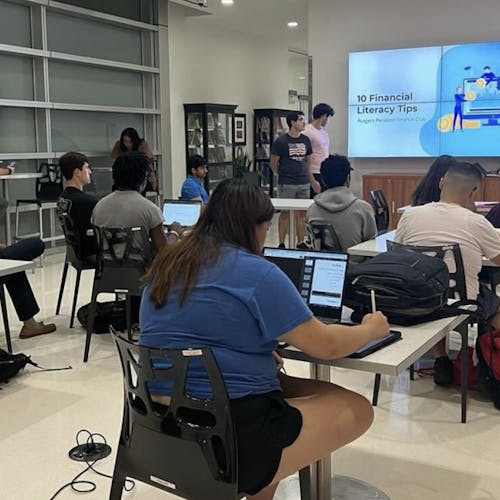Survey shows cutting-edge diversity in Rutgers business school faculty

Rutgers Business School was ranked among top 10 schools with the most diverse faculty in the United States, according to a <g>survey</g> conducted as a part of the <g>Ph.D.</g> Project, a project run by KPMG Foundation.
The survey covers the current academic year and it showed that, of the most diverse departments, North Carolina A&T had 22 black, Hispanic or Native American professors on faculty. Howard had 19, Florida A&M 15 and Rutgers 14, according to the data provided by The <g>Ph.D.</g> Project.
Professor Eugene Spiegle, an associate professor and undergraduate program director for supply chain management said the Business School places a great deal of importance on the diversity of its professors and faculty.
“In our department, we always look for a variety of persons. We don’t want to be a university that is all white or all black or all Asian,” he said.
He said the presence of diversity within the institution lends itself a learning curve that one does not get otherwise. This is why the department looks for professors with different work backgrounds to further the scope of learning.
When one looks at diversity in a university, they are looking for the quality of the person performing and the knowledge base of what they are teaching, he said.
“I do not base it on the ethnicity. I base it on the strength of the ability. I was raised learning that you are managed by performance, not by personalities ... I see if you can do a job well,” he said.
The two major Rutgers campuses — Newark and New Brunswick — have different compositions when it comes to diversity. Newark has a more significant Hispanic and black population, whereas many international students attend New Brunswick, he said.
“There exists about the same ratio of diversity in the professorial base as in students. It just happens to turn out that way,” Spiegel said.
April Lopez, a sophomore in the Rutgers Business School, said it is important to hear from professors who have different things to offer and experience working in different types of fields. The variety allows students to learn a lot more and get different perspectives.
“I have had all kinds of professors. The students here are quite diverse too. It is a perfect match between the professors and the students,” she said.
Diversity also shows that there are not a lot of biases and the institution and its students are open to different perspectives, she said.
“Coming together, it is also a representative of the country that we live in, that we want to embrace different cultures and show that we can all come together to learn something,” she said.
The Ph.D. project, which has been running since 1994, is dedicated to finding people from the minority groups interested in obtaining their doctorates and becoming business school professors, said Bernard J. Milano, president of KPMG.
He said the project focuses on the three most underrepresented groups in business education.
“We have a database of all minority business school faculty in the United States. We know who they are, where they are and what they are teaching,” he said.
The <g>Ph.D.</g> Project has resulted in a fourfold increase in the number of professors belonging to the minority groups from 294 to 1358. There are 300 others seeking doctoral degree currently, who will become professors in the next three to five years, he said.
Besides the president and seven other members <g>of</g> the foundation, they have hundreds of volunteers who come together as panelists, <g>presenters</g> and mentors to help with the project, he said.
“It is misleading to just look at the seven people who are working on the project. Supported by corporations, universities and individual professors, the project is a tremendous collaboration between the corporate world and higher education community in bringing more diversity in business school faculties,” he said.
The annual budget of the project is about $2.4 million, out of which $600,000 are funded by the KPMG Foundation, he said.
He said diversity among professors is critical for students of color to perform up to their potential. They will be motivated to pursue careers in different fields by following the examples of successful people with similarities to themselves.
“Diversity is important for majority groups too so that they recognize that people different from them can be bright, be leaders and be experts in their fields," Milano said. "It gives them an opportunity to learn from them, hence tearing down the stereotypes so that when they work with or for people of color, they have already been introduced to it which will make them more productive in their work."



